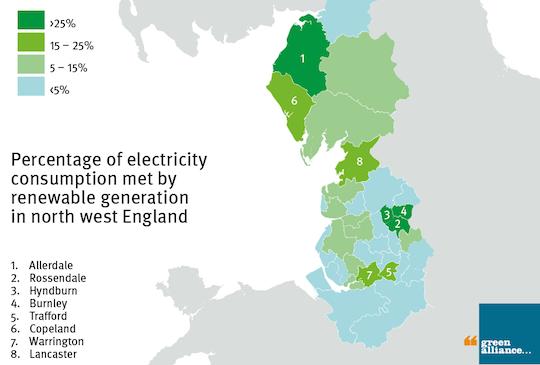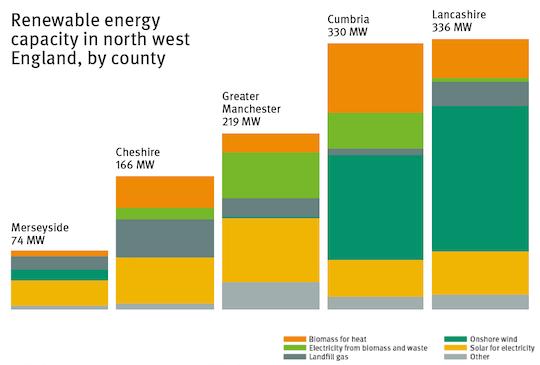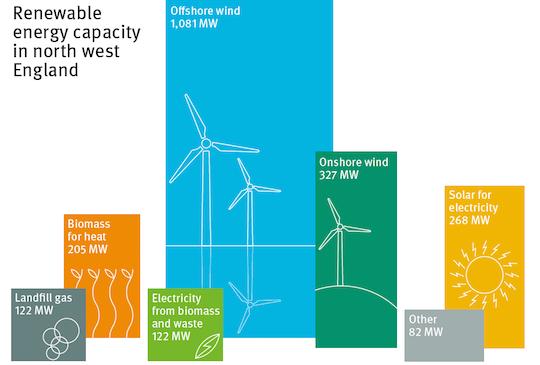
Powering the region with new Green Alliance report on renewables
In a comparison of the region's renewable energy capacity by environmental think tank Green Alliance, the report shows Lancashire and Cumbria ahead on levels of green energy generation, both boasting impressive levels of onshore wind and biomass for heat.
And in a finding that debunks the 'rainy city' myth, the study shows that while all five counties have good levels of rooftop solar, with more than 60,000 households across the region boasting solar panels, Greater Manchester wins on solar capacity, with 23,484 solar roofs.
Renewable energy is by far the most popular energy source with people in the UK according to official government statistics which show 78% of the public support the use of renewables, with only 4% against.
Locally, Allerdale was the top local authority, with 87% of its electricity consumption coming from renewable sources. Most of this is from onshore wind, but it is supplemented by power from biomass and waste, showing how an area’s electricity needs can be met by a diversity of renewable sources.
For the region as a whole, offshore wind is the dominant source of the North West’s renewable energy. The region currently has more than a gigawatt of offshore wind capacity installed. Enough to meet the electricity needs of one million households, five times the size of Liverpool.

As a whole, renewables are generating 19% of the region’s electricity consumption. For regions in England and Wales, this puts the North West in fourth place below Yorkshire and the Humber, Wales and the East of England.
According to Amy Mount, senior policy adviser at Green Alliance, the figures show a tangible shift. “In December, the whole world signed an agreement in Paris, committing to tackling climate change," she said. "But it’s not only global leaders who are taking this agenda seriously; these figures for the North West of England are exciting, as they show that local communities are seeing the benefits of the shift to clean energy.
"Across the region, families are putting solar panels on their roofs, and businesses are making major investments in cleantech."
"Across the region, families are putting solar panels on their roofs, and businesses are making major investments in cleantech. National government should match these commitments and recognise that it’s what local communities want, by stepping up support for the vital renewables industry.”


For Councillor Kate Chappell, Executive Member for the Environment at Manchester City Council, the findings give the city a reason to be proud.
"Manchester is proud to have joined many other great northern cities in pledging to move towards being powered exclusively by clean energy before 2050," she said. "We're working with other Greater Manchester authorities and partners, including the University of Manchester, to develop our collective understanding of low carbon energy, while exploring the potential for innovative locally generated renewable energy sources for the city.
"The emerging Manchester Strategy explains our commitment to reducing the city's carbon footprint, which includes the use of clean energy.
"Manchester was integral to the Industrial Revolution and we see ourselves as being ideally placed to help lead the Clean Energy Revolution, which is vital for all of our futures in the 21st century."
Image of Scout Moor by Flickr User Gidzy via a Creative Commons Licence www.flickr.com/photos/gidzy
Briefing: An outline of Greater Manchester's Low Carbon Hub
Contributed by Helen Seagrave
Contributor Profile
Steve is co-founder and CEO of Creative Concern. He specialises in ethical and sustainability issues, integrated campaigns, city strategies, brand development and creating strange installations out of trees, lights and beautiful type. Particular areas of expertise include climate change, place making, transport, food issues and the natural environment.




